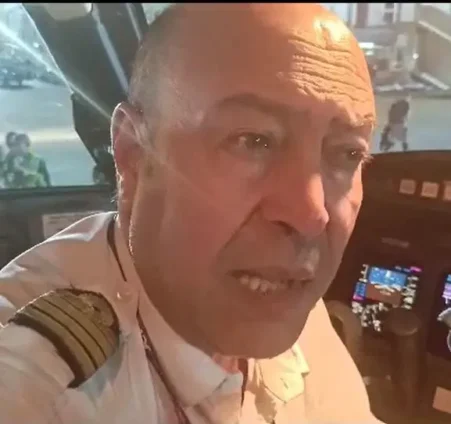
Audio By Carbonatix
The Tunisian pilot who flew the Nigerian national football team Super Eagles to Libya has provided an account of the events that led to their unexpected diversion to Al-Abraq, a remote airport, instead of their intended destination, Benghazi.
Controversy erupted after the Nigerian delegation, en route to Benghazi for Tuesday’s crucial 2025 Africa Cup of Nations qualifier against Libya, found themselves stranded for over 16 hours on Sunday following the diversion.
The plane was redirected to Al-Abraq, a small airport typically used for Hajj operations, located nearly 300 kilometers east of Benghazi.
In a video interview shared by Sports Journalist Pooja Media on X (formerly Twitter), the pilot clarified that the diversion was not his decision but was mandated by Libyan authorities.
“The flight plan was to land at Benghazi, Benina, and we had approval from the Libyan Civil Aviation Authority,” the pilot explained. “However, as we began our descent, we were instructed to divert to Al-Abraq, which wasn’t even listed as our alternate airport. This decision came from the highest Libyan authorities, not me.”
He expressed concern over the safety risks posed by the sudden change, noting that the fuel on board was calculated for the original destination.
“In aviation, we calculate fuel based on our destination. Diverting unexpectedly can compromise safety. I repeatedly questioned the directive and warned them about fuel limitations, but they insisted that we land at Al-Abraq, citing orders from the highest authority,” he said.
The pilot refuted media claims that the diversion was his decision, stressing that all aviation communications are recorded and could be provided as evidence. “Everything is documented. I asked to land in Benghazi as per my flight plan, but they denied it, instructing me to divert immediately,” he added.
The conditions at Al-Abraq posed further challenges. The pilot described the small airport as poorly equipped, lacking essential navigation systems like an Instrument Landing System (ILS) and VHF Omnidirectional Range (VOR), making a night landing in marginal weather conditions particularly difficult.
“I had to make a visual landing, which is risky, especially in those conditions. It was not easy, but fortunately, we landed safely,” he said, crediting his familiarity with the region from previous work for helping manage the situation.
In light of the ordeal, the Nigeria Football Federation (NFF) has decided to pull the Super Eagles out of the qualifier match against Libya.
Latest Stories
-
Ghana is rising again – Mahama declares
4 hours -
Firefighters subdue blaze at Accra’s Tudu, officials warn of busy fire season ahead
5 hours -
New Year’s Luv FM Family Party in the park ends in grand style at Rattray park
5 hours -
Mahama targets digital schools, universal healthcare, and food self-sufficiency in 2026
5 hours -
Ghana’s global image boosted by our world-acclaimed reset agenda – Mahama
5 hours -
Full text: Mahama’s New Year message to the nation
5 hours -
The foundation is laid; now we accelerate and expand in 2026 – Mahama
6 hours -
There is no NPP, CPP nor NDC Ghana, only one Ghana – Mahama
6 hours -
Eduwatch praises education financing gains but warns delays, teacher gaps could derail reforms
6 hours -
Kusaal Wikimedians take local language online in 14-day digital campaign
7 hours -
Stop interfering in each other’s roles – Bole-Bamboi MP appeals to traditional rulers for peace
7 hours -
Playback: President Mahama addresses the nation in New Year message
8 hours -
Industrial and Commercial Workers’ Union call for strong work ethics, economic participation in 2026 new year message
9 hours -
Crossover Joy: Churches in Ghana welcome 2026 with fire and faith
9 hours -
Traffic chaos on Accra–Kumasi Highway leaves hundreds stranded as diversions gridlock
10 hours

